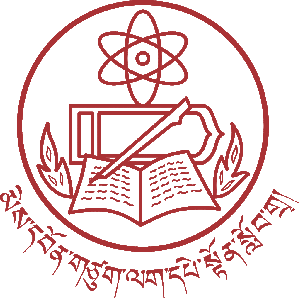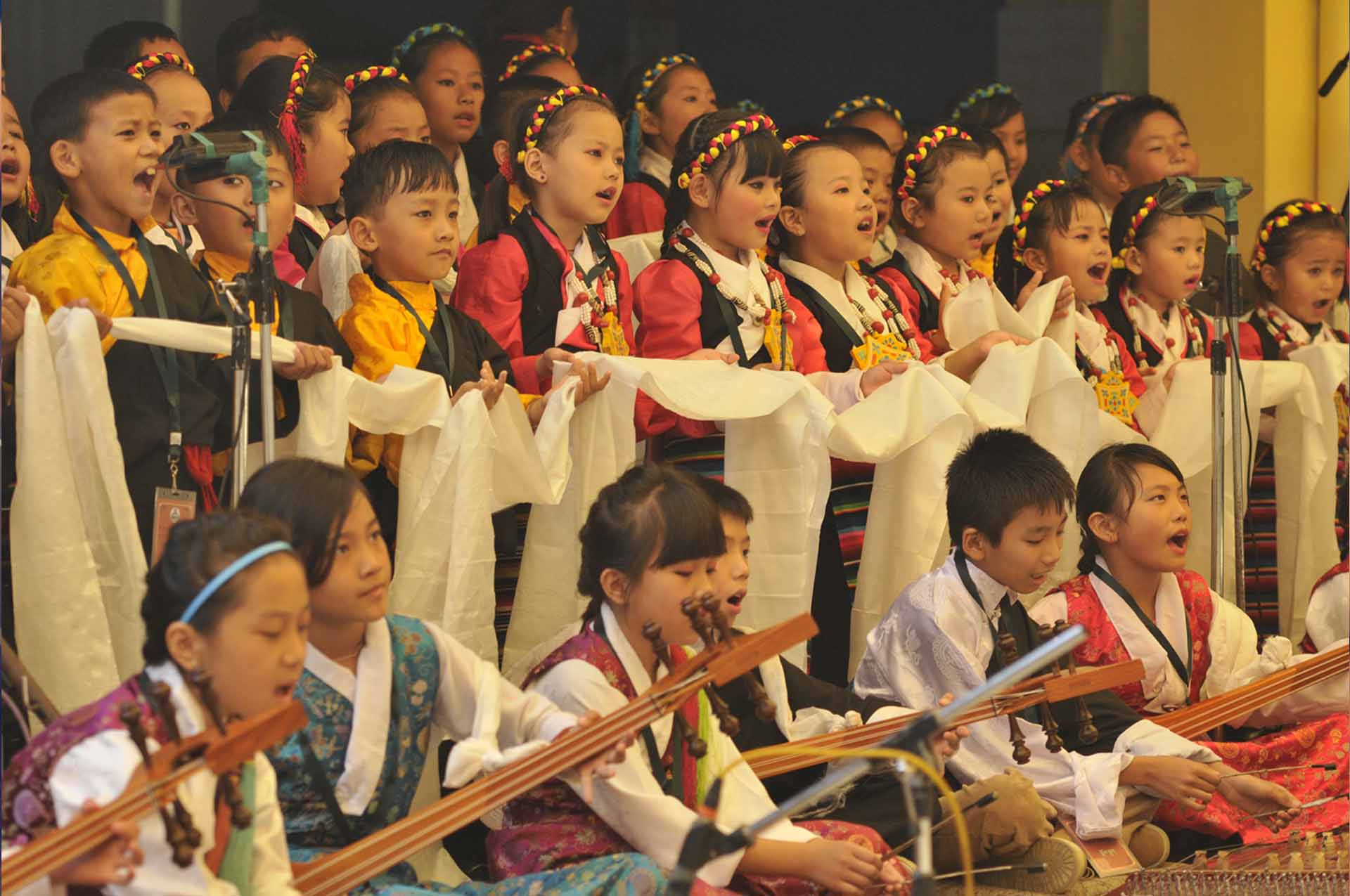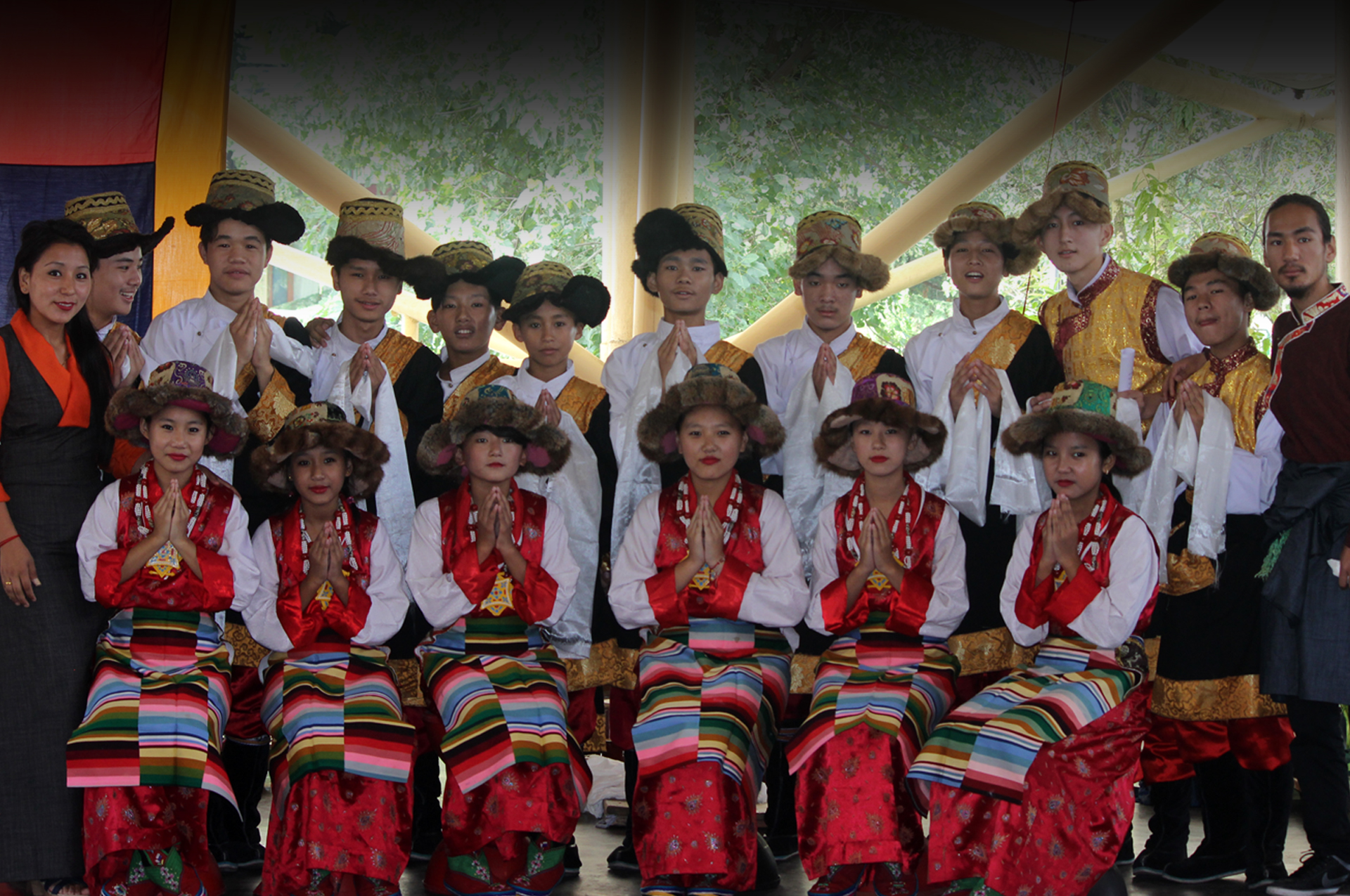ཤེས་ཡོན་གྱི་དགོས་པ།
སྤྱིར་ཤེས་ཡོན་གྱི་དགོས་པ།
- ཤེས་ཡོན་གྱི་དགོས་པ་ནི་མིའི་ཁྱད་ཆོས་ཤེས་རབ་དང་བྱམས་བརྩེ། དེ་དག་ལ་བརྟེན་པའི་བཟང་པོའི་ལྟ་སྤྱོད། གསར་གཏོད་སྒྱུ་རྩལ་བཅས་ཀྱི་ནུས་པ་རྣམས་སད་ཅིང་གོང་ནས་གོང་དུ་འཕེལ་བར་བྱེད་པ་དང༌།
- མིའི་ནང་གི་ཤེས་པའི་ནུས་པ་རྣམས་རྣམ་པར་སྦྱོང་ཞིང༌། ཤེས་བྱ་དང་བླང་དོར་གྱི་གནས་ལ་དཔྱད་པ་ཡང་དག་དང་གཞན་དྲིང་མི་འཇོག་པའི་སྒོ་ནས་འཇུག་པའི་ནུས་པ་སྟེར་བ་དང༌། དེ་ལ་བརྟེན་ནས་གང་ཟག་སོ་སོའི་འཕྲལ་ཕུགས་ཀྱི་མདུན་མ་ཙམ་མ་ཟད། རྒྱལ་ཁབ་དང་མི་རིགས། འཇིག་རྟེན་སྤྱིའི་རྩ་དོན་ཆེན་པོ་རྣམས་སྒྲུབ་ནུས་པར་བྱེད་པ།
- རང་གི་རྒྱལ་ཁབ་དང་ཡུལ་མི་གཉིས་ཀ་གཞན་གྱི་རོགས་སྐྱོར་ལ་བརྟེན་མི་དགོས་པར་རང་རྐང་ཚུགས་ཐུབ་པ་དང༌། རྒྱལ་གཅེས་ལྷག་བསམ་ཅན་གྱི་མི་སྣ་དང་རྒྱལ་ཁབ་དང་སྤྱི་ཚོགས་ཀྱི་མངོན་འདོད་སྒྲུབ་པའི་ནུས་པ་སྐྲུན་པར་བྱེད་པ་བཅས་ཡིན།།
བྱེ་བྲག་བོད་མིའི་ཤེས་ཡོན་གྱི་དགོས་པ།
- འཇིག་རྟེན་སྤྱི་ཡོངས་ལ་བོད་མིའི་ངོས་ནས་འཁྲི་བའི་ལས་འགན་ནི། བོད་ཀྱི་ཐུན་མོང་མ་ཡིན་པའི་རིག་གཞུང་དང་ལེགས་བྱང་གི་ཁྱད་ནོར་བཟང་པོ་སྐྱེ་འགྲོ་སྤྱི་ལ་ཕན་པ་རྣམས་ཡུལ་དུས་གནས་སྐབས་ཐམས་ཅད་དུ་རྒྱུན་འཛིན་དང་ཁྱབ་སྤེལ་ཐུབ་པ་བྱ་རྒྱུ་དང༌། ྋགོང་ས་ྋསྐྱབས་མགོན་སྐུ་ཕྲེང་བཅུ་བཞི་པ་ཆེན་པོ་མཆོག་གི་དགོངས་གཞི་ལྟར་འཇིག་རྟེན་ཡོངས་ཀྱི་དོན་ཆེན་ཁུར་དུ་འཁྱེར་བའི་ལྷག་བསམ་རྒྱ་ཆེར་བསྐྲུན་སྤེལ་ཐུབ་པ་བྱ་རྒྱུ་ཡིནཔས། དེ་དག་བསྒྲུབ་ཐུབ་པ་བྱ་རྒྱུ།
- བོད་མིའི་ཕུགས་ཀྱི་བསྒྲུབ་བྱ་ནི། ཆོལ་གསུམ་ཡོངས་སུ་རྫོགས་པའི་བོད་ཡུལ་འཚེ་མེད་ཞི་བའི་བསྟི་གནས་སུ་བསྒྱུར་རྒྱུ་དང༌། བོད་མིའི་སྤྱི་ཚོགས་འཚེ་མེད་ཞི་བའི་སྤྱི་ཚོགས་སུ་བསྒྱུར་རྒྱུ། མི་རིགས་གཞན་ལ་འཚེ་བ་མེད་པ་དང་བྱམས་བརྩེའི་ལམ་གྱི་སྣ་འཁྲིད་བྱ་རྒྱུ་བཅས་ཡིན་པས། བསྒྲུབ་བྱ་དེ་དག་གི་ལམ་ཕྱོགས་དང་ཐབས་བྱུས་ཚང་ལ་མ་ནོར་བ་རྟོགས་ཐུབ་པ་བྱ་རྒྱུ།
- བོད་ནི་འཛམ་གླིང་ས་ཡི་ཡང་ཐོག་ཏུ་ཆགས་ཤིང༌། དེའི་རང་བྱུང་འབྱུང་བའི་ཁམས་ཀྱི་གཏེར་མཛོད་རྣམས་འཛམ་གླིང་སྤྱི་དང་བྱེ་བྲག་ཨེ་ཤ་ཡའི་རྒྱལ་ཁབ་ཁག་གི་བདེ་དོན་ལ་འབྲེལ་ལྟོས་ཆེ་བས། བོད་ཀྱི་ཁོར་ཡུག་སྲུང་སྐྱོབ་བྱ་རྒྱུའི་བོད་མིའི་རྩ་དོན་བསྒྲུབ་ནུས་པ་བྱ་རྒྱུ།
- བོད་མིའི་ཆབ་སྲིད་ཀྱི་རྩ་དོན་ཆོལ་གསུམ་བོད་རིགས་ཡོངས་ལ་ཆིག་སྒྲིལ་དང༌། རང་དབང༌། མང་གཙོ། ཁྲིམས་ཀྱི་དབང་འཛིན། འཚེ་བ་མེད་པ། དྲང་བདེན་བཅས་ཀྱི་ཁེ་ཕན་བསྒྲུབ་དགོས་པའི་དོན་གནད་རྣམས་བོད་མི་རྒན་གཞོན་ཐམས་ཅད་ཀྱིས་གོ་རྟོགས་དང་ཉམས་ལེན་ཐུབ་པ་བྱ་རྒྱུ།
- བོད་མིའི་དཔལ་འབྱོར་གྱི་ལམ་སྲོལ་ཡང་གོང་དུ་བཀོད་པའི་རྩ་དོན་སྙིང་པོ་ཁག་དང་མི་འགལ་བར་དར་ཁྱབ་ཆེ་བའི་མ་རྩ་དང་སྤྱི་ཚོགས་རིང་ལུགས་ཀྱི་མཐའ་གཉིས་སྤོང་ཞིང༌། འདོད་བསོད་དང་ངལ་དུབ་ཀྱི་མཐའ་གཉིས་སྤོང་བ། ལོག་པའི་འཚོ་བར་མི་བརྟེན་པ། རང་ཁ་རང་གསོ་ཐུབ་པ་བཅས་ཀྱི་ལམ་སྲོལ་ཡང་དག་ཐོག་འགྲོ་ཐུབ་པ་བྱ་རྒྱུ།།
THE PURPOSE OF EDUCATION
The Purpose of Education in General
-
The general purpose of education is to awaken and develop the human qualities of wisdom, loving kindness and compassion; their dependent virtues of right view and conduct; and the art of creativity and innovation.
-
To refine human perceptions and sensitivities and to initiate independent and valid investigation into phenomenal and ethical spheres, thus enabling the accomplishment of personal, national and universal goals;
-
To empower people and nation to become self-reliant, i.e. without the need to depend on the assistance and support of others; and to generate patriotic and dedicated persons and other resources for achieving the cherished goals of the society and nation.
Education for Tibetan People in Particular
- A responsibility the Tibetan people have towards the world community is to preserve and promote the unique wealth of Tibetan culture and traditions, which are of great value to the whole of humanity, through all times and circumstances. Another responsibility the Tibetan people have to the world is to promote and widely propagate the noble principle of Universal Responsibility as introduced and initiated by His Holiness the XIV Dalai Lama. These responsibilities are to be fulfilled.
- The ultimate goal of the Tibetan people is to transform the whole of the three Cholkhas of Tibet into a zone of non-violence (ahimsa) and peace; to transform Tibetan society into a non-violent society; and to lead other peoples onto the path of non-violence and compassion. Thus, the Tibetan people must be made capable of correctly and fully understanding the direction, path and means to this goal.
- Tibet is situated on the roof of the world and her wealth of natural resources has a close bearing on the well-being of all Asian nations and the world at large. Thus, it is of paramount importance that the Tibetan people should be able to preserve the natural environment of Tibet.
- A political goal of the Tibetan people is to instill in all Tibetan races of the three Cholkhas the principles of unity, freedom, democracy, rule of law, non-violence, truth and justice. It must be ensured that all Tibetans irrespective of their age properly understand and live by these principles.
- The Tibetan system of economy must also be in accordance with the aforesaid fundamental principles. The Tibetan people must therefore avoid: the two widespread extremes of capitalism and socialism; the two livelihood extremes of luxuriance and destitution; and reliance on wrong means of livelihood. A system ensuring self-sufficiency and right means of livelihood must therefore be followed.





